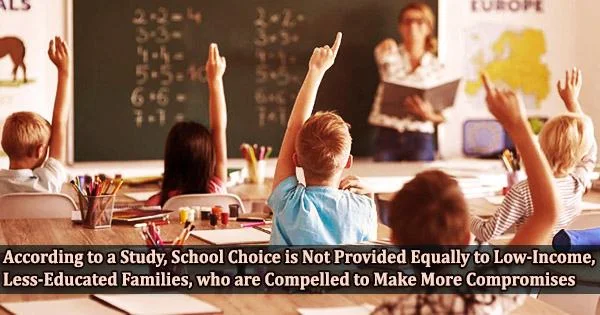Every parent wants to send their kids to the best school available. But sometimes you can’t always get what you want, as the saying goes.
A new study from the University of Kansas shows that low-income parents, those from marginalized racial and ethnic backgrounds and those with lower educational attainment tend to compromise more on school features they prefer compared to their predominantly white, affluent peers. This variation in preference compromise is directly related to the level of satisfaction parents have with the schools they select for their children.
In American education, there is an ongoing discussion regarding “school choice,” a policy that is becoming more and more popular that allows parents of children enrolled in public schools to freely choose other schools than the ones to which they are allocated. Traditionally, this kind of choice was limited to private schools, but modern school choice policies have expanded it to include an increasing number of charter and magnet schools.
Traditional community schools in several districts also provide varying degrees of parental choice. According to the argument in support of school choice, families and students will all perform better if individuals have the freedom to select the school that their children attend depending on the school’s characteristics.
“The commonsense view seems to be that if you provide choice, people who choose their school will be happier with what they get,” said study lead author Argun Saatcioglu, KU professor of educational leadership & policy studies and sociology. “One thing that has always bugged me about that is the question: ‘Are people really able to act on their true preferences and to what degree?’”
Whether parents compromise on school features they prefer has not been thoroughly studied, an issue that goes to the heart of the “school choice” policy.
If you want an effective and equitable choice system, you have to make sure that not so much compromise is happening. Everyone has to make compromises in life, but here the disparities were such that they didn’t allow all parents to make choices equitably. The system now is just tending to reproduce existing hierarchies. The affluent tend to make fewer compromises because they don’t have to.
Argun Saatcioglu
To bridge the gap, Saatcioglu and co-author Anthony Snethen, who earned his doctorate in educational leadership & policy studies from KU in 2021 and is currently at the International School of Panama, relied on data from a statistically representative sample of 436 parents in Kansas City, Missouri.
The data were collected in 2015-2016 across multiple locations to find out what parents looked for when choosing a school, where their children attended school and how happy the parents were with their chosen school.
Importantly, the parents were asked to provide information on their ideal school preferences where they could have anything they wanted, including good teachers, diverse students, foreign language instruction, a good location, safety, and good facilities and then to provide the same information under actual, real-world circumstances, where limitations might prevent them from acting on their ideal preferences.
The study develops a novel methodology and related procedures to compare the two sets of responses in order to estimate the degree of “preference compromise” of each parent.
The findings demonstrate that parents of all income levels, ages, educational backgrounds, and demographic groups consider a wide range of criteria in a school. However, parents with poorer incomes, less education, and those from minority racial and ethnic groups are more likely to have to give up on their preferences. And greater compromise is related to lower satisfaction with a chosen school.
The study was published in the journal Educational Evaluation and Policy Analysis.
The researchers chose KCMO because it is a metropolitan location with abundant school choice. Parents are allowed to choose what public, charter or private school they send their children to, regardless of their location.
“There are always capacity issues,” Saatcioglu said, but technically all schools are open to all parents. Kansas City, Missouri, is also a location with greater economic and racial variance among residents.
“The idea was to see who’s more susceptible to making compromises,” Saatcioglu said. “People who are most in need of choices are making the most compromises. That doesn’t make sense to me. It should be the other way around.”
It was discovered that the wealthy parents in the study made fewer concessions between what they expected in a school in an ideal setting and what they considered to be the most crucial aspects of the schools their child attended. More concessions had to be made by those who were less well-off and had less education. And the former group was more satisfied with the schools their students attended.
Saatcioglu said the results also showed that low-income and historically marginalized populations do not have “choice illiteracy” or an inability to understand what school would be best. This cynical viewpoint of low-income communities is widespread, he claimed, but it is refuted by data that demonstrate how widely disparate all demographics’ preferences for their kids were.
“The question became, ‘Are low-income and less-educated parents just as heterogeneous as everyone else in their preference formation?’ It turns out they are,” Saatcioglu said. “This shows they are just as capable of making complex choices as anyone else.”
Researchers also considered geographic data. Participants reported the ZIP code in which they lived and what school their children attended. Because reputable charter or private schools are rarely found close to lower-income communities, people who lived in them were less likely to enroll their kids there.
That lends support to the notion that families with poor incomes face more difficulties, such as a lack of transportation or the inability to take time out of work to drive children further distances to school. The general public indicated that basic issues like safety, reducing crime around schools, and serving breakfast and lunch at schools should be prioritized.
According to the study’s findings, if school choice is to be the standard for educational policy, it must first be ensured that regional social, economic, and racial disparities are significantly minimized.
“If you want an effective and equitable choice system, you have to make sure that not so much compromise is happening,” Saatcioglu said. “Everyone has to make compromises in life, but here the disparities were such that they didn’t allow all parents to make choices equitably. The system now is just tending to reproduce existing hierarchies. The affluent tend to make fewer compromises because they don’t have to.”
















